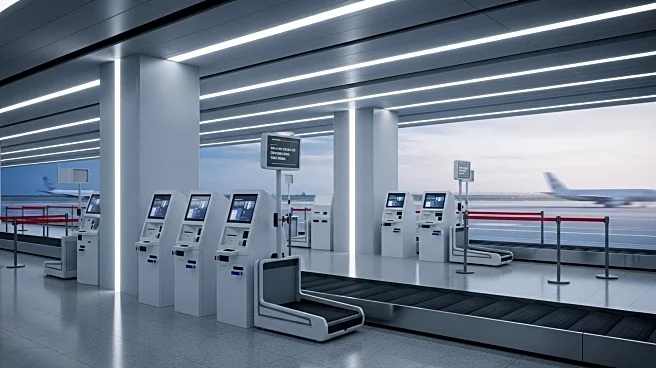What is the story about?
What's Happening?
The global airport automation market is projected to grow significantly from USD 8.78 billion in 2025 to USD 19.54 billion by 2035, with a compound annual growth rate (CAGR) of 7.53%. This growth is driven by the integration of advanced technologies such as self-service kiosks, biometric solutions, and automated baggage handling systems aimed at enhancing operational efficiency and passenger experience. The market is segmented by type of system, technology, level of automation, airport operation, and end user. Currently, the automation & control segment holds the majority market share, while the data storage segment is expected to grow rapidly due to the increasing data generated by automated systems. The baggage handling systems segment is also anticipated to experience significant growth, attributed to its role in improving operational efficiency and passenger satisfaction.
Why It's Important?
The expansion of the airport automation market is crucial for the aviation industry as it seeks to accommodate rising passenger numbers, particularly in regions like Southeast Asia. Automation technologies are essential for reducing wait times, minimizing human error, and lowering operational costs, which in turn enhance customer satisfaction and loyalty. The growth of this market is expected to benefit commercial airports the most, as they handle a large volume of passengers and flights daily, necessitating advanced technological solutions. Additionally, the market's growth in Asia, driven by a rising middle class and increased air travel demand, highlights the global shift towards smart airport projects and the need for improved operational efficiency.
What's Next?
As the airport automation market continues to grow, stakeholders are likely to focus on further integrating advanced technologies to optimize airport operations. This includes expanding the use of self-service technologies and enhancing data management systems to handle the increasing volume of information. The market's growth in Asia suggests that investments in smart airport projects will continue, driven by the need to accommodate rising passenger numbers and improve customer satisfaction. Companies involved in the market, such as ABB, Amadeus IT, and Cisco Systems, are expected to play a significant role in shaping the future of airport automation.
Beyond the Headlines
The push towards airport automation raises important considerations regarding data privacy and security, particularly with the increased use of biometric solutions. As airports become more reliant on technology, ensuring the protection of passenger data will be paramount. Additionally, the shift towards automation may impact employment within the aviation sector, as traditional roles are replaced by automated systems. This transition will require careful management to balance technological advancement with workforce implications.















